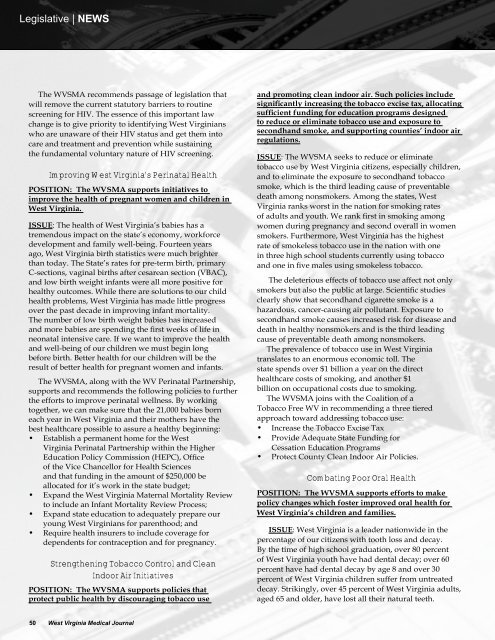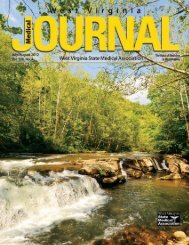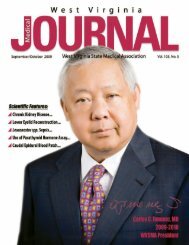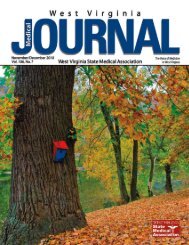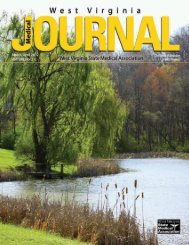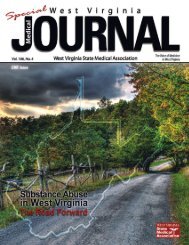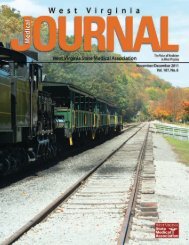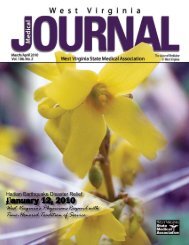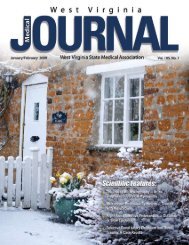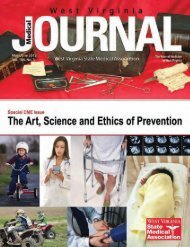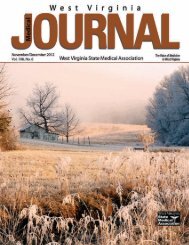March/April - West Virginia State Medical Association
March/April - West Virginia State Medical Association
March/April - West Virginia State Medical Association
Create successful ePaper yourself
Turn your PDF publications into a flip-book with our unique Google optimized e-Paper software.
Legislative | NEWS<br />
The WVSMA recommends passage of legislation that<br />
will remove the current statutory barriers to routine<br />
screening for HIV. The essence of this important law<br />
change is to give priority to identifying <strong>West</strong> <strong>Virginia</strong>ns<br />
who are unaware of their HIV status and get them into<br />
care and treatment and prevention while sustaining<br />
the fundamental voluntary nature of HIV screening.<br />
Improving <strong>West</strong> <strong>Virginia</strong>’s Perinatal Health<br />
POSITION: The WVSMA supports initiatives to<br />
improve the health of pregnant women and children in<br />
<strong>West</strong> <strong>Virginia</strong>.<br />
ISSUE: The health of <strong>West</strong> <strong>Virginia</strong>’s babies has a<br />
tremendous impact on the state’s economy, workforce<br />
development and family well-being. Fourteen years<br />
ago, <strong>West</strong> <strong>Virginia</strong> birth statistics were much brighter<br />
than today. The <strong>State</strong>’s rates for pre-term birth, primary<br />
C‐sections, vaginal births after cesarean section (VBAC),<br />
and low birth weight infants were all more positive for<br />
healthy outcomes. While there are solutions to our child<br />
health problems, <strong>West</strong> <strong>Virginia</strong> has made little progress<br />
over the past decade in improving infant mortality.<br />
The number of low birth weight babies has increased<br />
and more babies are spending the first weeks of life in<br />
neonatal intensive care. If we want to improve the health<br />
and well-being of our children we must begin long<br />
before birth. Better health for our children will be the<br />
result of better health for pregnant women and infants.<br />
The WVSMA, along with the WV Perinatal Partnership,<br />
supports and recommends the following policies to further<br />
the efforts to improve perinatal wellness. By working<br />
together, we can make sure that the 21,000 babies born<br />
each year in <strong>West</strong> <strong>Virginia</strong> and their mothers have the<br />
best healthcare possible to assure a healthy beginning:<br />
• Establish a permanent home for the <strong>West</strong><br />
<strong>Virginia</strong> Perinatal Partnership within the Higher<br />
Education Policy Commission (HEPC), Office<br />
of the Vice Chancellor for Health Sciences<br />
and that funding in the amount of $250,000 be<br />
allocated for it’s work in the state budget;<br />
• Expand the <strong>West</strong> <strong>Virginia</strong> Maternal Mortality Review<br />
to include an Infant Mortality Review Process;<br />
• Expand state education to adequately prepare our<br />
young <strong>West</strong> <strong>Virginia</strong>ns for parenthood; and<br />
• Require health insurers to include coverage for<br />
dependents for contraception and for pregnancy.<br />
Strengthening Tobacco Control and Clean<br />
Indoor Air Initiatives<br />
POSITION: The WVSMA supports policies that<br />
protect public health by discouraging tobacco use<br />
and promoting clean indoor air. Such policies include<br />
significantly increasing the tobacco excise tax, allocating<br />
sufficient funding for education programs designed<br />
to reduce or eliminate tobacco use and exposure to<br />
secondhand smoke, and supporting counties’ indoor air<br />
regulations.<br />
ISSUE: The WVSMA seeks to reduce or eliminate<br />
tobacco use by <strong>West</strong> <strong>Virginia</strong> citizens, especially children,<br />
and to eliminate the exposure to secondhand tobacco<br />
smoke, which is the third leading cause of preventable<br />
death among nonsmokers. Among the states, <strong>West</strong><br />
<strong>Virginia</strong> ranks worst in the nation for smoking rates<br />
of adults and youth. We rank first in smoking among<br />
women during pregnancy and second overall in women<br />
smokers. Furthermore, <strong>West</strong> <strong>Virginia</strong> has the highest<br />
rate of smokeless tobacco use in the nation with one<br />
in three high school students currently using tobacco<br />
and one in five males using smokeless tobacco.<br />
The deleterious effects of tobacco use affect not only<br />
smokers but also the public at large. Scientific studies<br />
clearly show that secondhand cigarette smoke is a<br />
hazardous, cancer-causing air pollutant. Exposure to<br />
secondhand smoke causes increased risk for disease and<br />
death in healthy nonsmokers and is the third leading<br />
cause of preventable death among nonsmokers.<br />
The prevalence of tobacco use in <strong>West</strong> <strong>Virginia</strong><br />
translates to an enormous economic toll. The<br />
state spends over $1 billion a year on the direct<br />
healthcare costs of smoking, and another $1<br />
billion on occupational costs due to smoking.<br />
The WVSMA joins with the Coalition of a<br />
Tobacco Free WV in recommending a three tiered<br />
approach toward addressing tobacco use:<br />
•<br />
•<br />
Increase the Tobacco Excise Tax<br />
Provide Adequate <strong>State</strong> Funding for<br />
Cessation Education Programs<br />
Protect County Clean Indoor Air Policies.<br />
•<br />
Combating Poor Oral Health<br />
POSITION: The WVSMA supports efforts to make<br />
policy changes which foster improved oral health for<br />
<strong>West</strong> <strong>Virginia</strong>’s children and families.<br />
ISSUE: <strong>West</strong> <strong>Virginia</strong> is a leader nationwide in the<br />
percentage of our citizens with tooth loss and decay.<br />
By the time of high school graduation, over 80 percent<br />
of <strong>West</strong> <strong>Virginia</strong> youth have had dental decay; over 60<br />
percent have had dental decay by age 8 and over 30<br />
percent of <strong>West</strong> <strong>Virginia</strong> children suffer from untreated<br />
decay. Strikingly, over 45 percent of <strong>West</strong> <strong>Virginia</strong> adults,<br />
aged 65 and older, have lost all their natural teeth.<br />
50 <strong>West</strong> <strong>Virginia</strong> <strong>Medical</strong> Journal


